
Alfred Russel Wallace was a British naturalist, explorer, geographer, anthropologist, biologist and illustrator. He is best known for independently conceiving the theory of evolution through natural selection; his paper on the subject was jointly published with some of Charles Darwin's writings in 1858.This prompted Darwin to publish On the Origin of Species.

The Wallace Line or Wallace's Line is a faunal boundary line drawn in 1859 by the British naturalist Alfred Russel Wallace and named by English biologist Thomas Henry Huxley that separates the biogeographical realms of Asia and Wallacea, a transitional zone between Asia and Australia. West of the line are found organisms related to Asiatic species; to the east, a mixture of species of Asian and Australian origin is present. Wallace noticed this clear division during his travels through the East Indies in the 19th century.
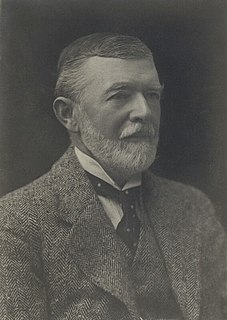
Henry Campbell Bruce, 2nd Baron Aberdare, styled The Honourable from 1873 to 1895, was a British soldier and peer.
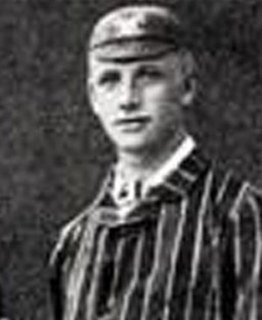
Charles Frederick Henry Leslie was an English businessman and cricketer. He played first-class cricket for eight years between 1881 and 1888, for Oxford University, Middlesex and England.
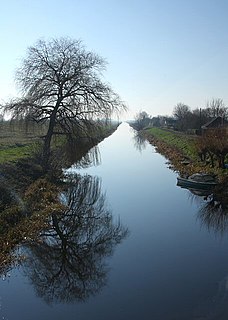
The Bedford Level experiment is a series of observations carried out along a 6-mile (9.7 km) length of the Old Bedford River on the Bedford Level of the Cambridgeshire Fens in the United Kingdom, during the 19th and early 20th centuries, to measure the curvature of the Earth. Samuel Birley Rowbotham, who conducted the first observations starting in 1838, claimed that he had proven the Earth to be flat. However, in 1870, after adjusting Rowbotham's method to avoid the effects of atmospheric refraction, Alfred Russel Wallace found a curvature consistent with a spherical Earth.
John Joseph Bennett was a British botanist.
Alfred George Fysh Machin was an early twentieth-century British writer on the evolution of societies. Writing at the time when Darwin's theory of evolution was being reappraised in the light of the discovery of Gregor Mendel's work and advances in our knowledge of genetics, he tries to make sense of society in evolutionary terms.
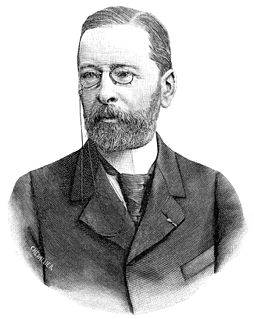
Paul Thureau-Dangin, member of the Académie française, was a historian of the reign of Louis-Philippe and also of the revival of Catholic thought in nineteenth century Britain.
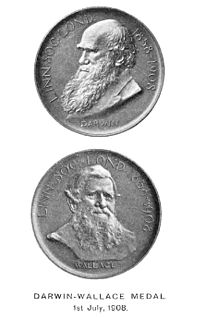
The Darwin–Wallace Medal is a medal awarded by the Linnean Society of London for "major advances in evolutionary biology". Historically, the medals have been awarded every 50 years, beginning in 1908. That year marked 50 years after the joint presentation by Charles Darwin and Alfred Russel Wallace of two scientific papers—On the Tendency of Species to form Varieties; and on the Perpetuation of Varieties and Species by Natural Means of Selection—to the Linnean Society of London on 1 July 1858. Fittingly, Wallace was one of the first recipients of the medal, in his case it was, exceptionally, in gold, rather than the silver version presented in the six other initial awards. However, in 2008 the Linnean Society announced that due to the continuing importance of evolutionary research, the medal will be awarded on an annual basis beginning in 2010.
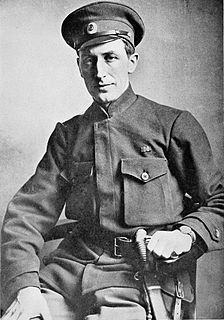
Robert Scotland Liddell (1885-1972) was a British reporter and photographer for The Sphere newspaper, who covered the events on the Russian front during the World War I.
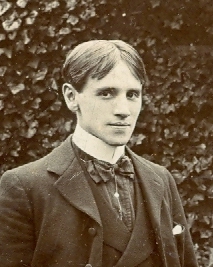
Alfred Garth Jones (1872–1955) was an English artist and illustrator who worked mainly in woodcut, pen and ink line art drawing and watercolour.
Michael John Fitzgerald McCarthy (born in Midleton, County Cork was an Irish lawyer and an anti-clerical author.

William Carpenter was an English printer and author, and a proponent of the flat Earth theory, active in England and the United States in the nineteenth century. Carpenter immigrated to the United States and continued his advocacy of the Flat Earth movement.
Mabel Cosgrove Wodehouse Pearse, also known as Mabel Cosgrove and as Mrs. or Princess Chantoon, was an Irish writer who married Prince Chantoon, the nephew of the King of Burma. She is known for her novels about Burma, particularly A Marriage in Burmah, and for a controversy surrounding the authorship of For Love of the King, a play that she claimed had been written by the Irish playwright Oscar Wilde.
Charles Tylor was an English Quaker author. He was the founding editor of Quaker weekly publication, The Friend. He was a Recorded Minister of the Religious Society of Friends.

The centenary of the death of the naturalist Alfred Russel Wallace on 7 November 1913 was marked in 2013 with events around the world to celebrate his life and work. The commemorations was co-ordinated by the Natural History Museum, London.
The Land Tenure Reform Association (LTRA) was a British pressure group for land reform, founded by John Stuart Mill in 1868. The Association opposed primogeniture, and sought legal changes on entails. Its programme fell short of the nationalisation of land demanded by the contemporary Land and Labour League.

James Keighley Snowden was the author of about fourteen volumes of fiction from 1893 to 1937 in addition to several works of non-fiction. Writing also as Keighley Snowden, today his writings are largely forgotten.
Harold Philip Clunn was a British shipping agent and non-fiction author known for his topographical works in the Face of... series. Reviewers commented on the exhaustive scope of his work and his unsentimental attitude to the expansion of London and the destruction of its buildings through redevelopment and during the Blitz of the Second World War.
Simpkin & Marshall was a British bookseller, book wholesaler and book publisher. The firm was founded in 1819 and traded until the 1940s. For many decades the firm was Britain's largest book wholesaler and a respected family-owned company, but it was acquired by the media proprietor Robert Maxwell and went bankrupt in 1954, an event which, according to Lionel Leventhal, "sounded a warning to the book trade about Captain Robert Maxwell's way of doing business".











